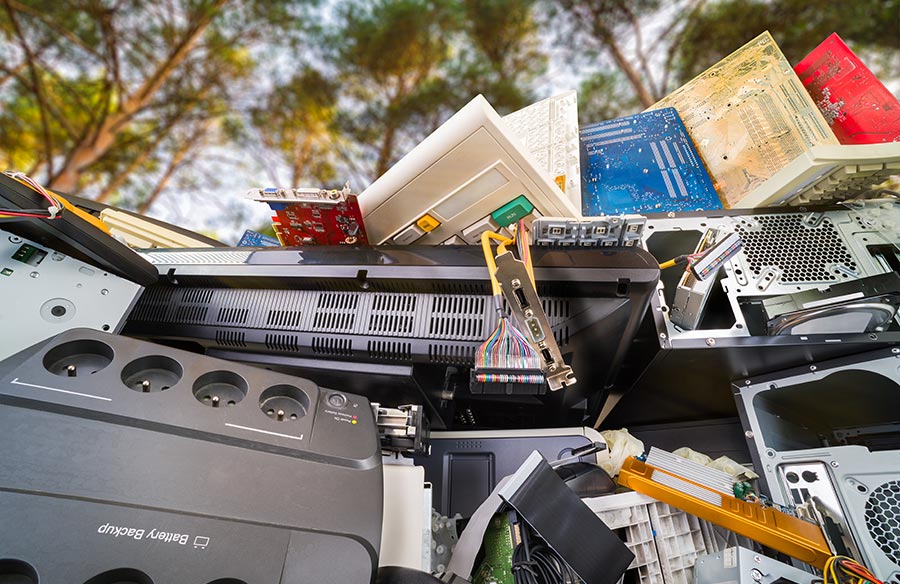Environmental Stewardship: The Importance of Computer Recycling
Sustainable IT Solutions: Trustworthy Computer System Recycling Provider
In light of this, the need for trustworthy computer system reusing solutions has never been even more vital. In this discussion, we will discover the environmental impact of e-waste, the advantages of accountable computer recycling, how to select a reliable recycling solution, the recycling procedure for computers and digital tools, and the duty of federal government laws in e-waste management.
The Environmental Influence of E-Waste
The incorrect disposal of digital waste, typically recognized as e-waste, has considerable environmental effects. E-waste describes disposed of digital tools such as computers, tvs, and smartphones (computer recycling). These devices contain unsafe materials such as lead, mercury, cadmium, and brominated fire retardants, which can be dangerous to both human health and the environment otherwise appropriately taken care of
When e-waste is incorrectly dealt with, it frequently winds up in landfills or is blazed, launching toxic materials right into the air, soil, and water. The release of these harmful materials can contaminate groundwater, pollute the air, and contribute to dirt degradation, presenting severe health dangers to neighboring areas and communities.
In addition, the improper disposal of e-waste additionally contributes to the exhaustion of natural deposits. computer recycling. Lots of electronic devices have beneficial steels like gold, silver, and copper that can be recuperated and recycled if correctly recycled. When e-waste is not reused, these valuable sources are lost, and the need for new raw products rises, leading to boosted mining tasks and further environmental deterioration.
To mitigate the environmental impact of e-waste, appropriate recycling and disposal methods must be employed. This consists of the accountable collection, dismantling, and recycling of digital gadgets to recover important materials and make sure the safe monitoring of unsafe materials. Implementing efficient e-waste monitoring techniques is essential to protect the atmosphere, preserve sources, and promote a lasting future.

Advantages of Accountable Computer System Recycling
Correctly recycling computers offers a plethora of advantages, consisting of ecological preservation and resource conservation. Accountable computer reusing not only helps avoid electronic waste from ending up in land fills, however it additionally minimizes the need for raw materials and energy in the manufacturing of brand-new tools.
One of the most considerable benefits of liable computer recycling is the conservation of the environment. When digital waste is improperly disposed of, it can launch unsafe compounds such as lead, mercury, and cadmium right into the soil and water, presenting a threat to ecological communities and human health and wellness. By reusing computers, these dangerous products can be safely drawn out and disposed of, lessening the threat of pollution.
One more benefit is resource conservation. Computers have valuable materials like gold, aluminum, silver, and copper, which can be recuperated and recycled via reusing procedures. By extracting and reusing these products, the need for mining new sources is reduced, conserving natural deposits and reducing the environmental effect of source removal.
In addition, responsible computer recycling helps to decrease energy usage. Manufacturing new computer systems needs a substantial quantity of power, from the removal of resources to the setting up procedure. By reusing computer systems and recycling their parts, the energy-intensive production procedure can be stayed clear of, leading to a reduction in greenhouse gas exhausts and an extra lasting use energy resources.
Exactly How to Select a Trustworthy Computer Recycling Service
When selecting a computer reusing solution, it is necessary to think about a few essential factors to ensure that you choose a trustworthy and reputable company. First of all, it is essential to verify if the reusing service adheres to correct ecological guidelines and methods. A trustworthy carrier will certainly have certifications and certifications that show their commitment to liable recycling. Search for certifications such as R2 (Accountable Recycling) or e-Stewards, site which ensure that the reusing process fulfills stringent criteria for environmental protection and information security. Second of all, check if the service provides secure information damage. Data security is a vital concern when recycling computer systems, as sensitive info saved on old devices can be at risk like it to theft or misuse. A reliable recycling service ought to have safe and secure data damage methods in position, such as data wiping or physical destruction of storage space devices. In addition, consider the service's performance history and online reputation. Seek testimonials or testimonials from previous clients to gauge their level of customer contentment and reliability. Finally, think about the solution's openness and liability. A credible supplier should be able to provide comprehensive info regarding their recycling process, including how they deal with harmful products and make sure appropriate disposal. By thinking about these aspects, you can select a computer recycling service that is ethical, dependable, and environmentally responsible.
The Recycling Refine for Computers and Digital Tools
To guarantee responsible disposal and decrease environmental impact, recognizing the recycling procedure for computers and digital gadgets is vital when selecting a trustworthy recycling service. The reusing process for these tools normally involves numerous stages.
To start with, the devices are accumulated from individuals, organizations, or drop-off points. see this website This collection procedure may entail transportation logistics and safe dealing with to shield the sensitive information contained within the tools. As soon as collected, the tools are arranged based on their kind, such as mobile phones, desktops, or laptop computers.
After arranging, the devices go through a detailed data devastation procedure to ensure that any type of sensitive or personal information is permanently eliminated. This action is essential to secure the personal privacy and protection of individuals and organizations. Data damage approaches might consist of cleaning, degaussing, or physical destruction of the storage media.
Next, the devices are taken apart into their private elements. This permits the splitting up of various products, such as plastics, steels, and circuit boards. These materials are after that sent to specialized recycling centers for further handling.
The recycling centers use numerous techniques to draw out important products from the electronic waste. These products can be recycled or repurposed in the production of new products. The continuing to be waste is thrown away in an environmentally accountable manner, adhering to regulatory standards.
The Role of Federal Government Laws in E-Waste Monitoring
Federal government guidelines play a crucial duty in the effective administration of e-waste. With the continuous growth of the electronics sector and the enhancing concern for ecological sustainability, the demand for appropriate disposal and recycling of digital waste has come to be more apparent. Government laws help to make sure that e-waste is handled in a accountable and lasting way.
Among the key duties of federal government laws is to set requirements and guidelines for e-waste management. These laws specify the proper techniques for collection, transport, and recycling of digital waste. By establishing these criteria, governments can make certain that e-waste is dealt with in such a way that reduces its effect on the setting and human wellness.
This includes implementing take-back programs, where suppliers are responsible for accumulating and recycling digital waste from consumers. These regulations aid to move the problem of e-waste monitoring from the individual consumer to the market, ensuring that electronic waste is managed in a more sustainable fashion.

Verdict
To conclude, it is crucial to consider the environmental impact of e-waste and choose a trustworthy computer reusing solution to sensibly take care of digital tools. By complying with federal government guidelines and taking part in proper recycling processes, we can reduce the unfavorable effects of e-waste on the environment and advertise an extra lasting future.
In this discussion, we will discover the ecological effect of e-waste, the benefits of responsible computer system recycling, how to choose a trustworthy recycling solution, the recycling process for computer systems and electronic devices, and the duty of federal government policies in e-waste management. Computer systems consist of important products like gold, light weight aluminum, silver, and copper, which can be recovered and recycled with recycling procedures.Moreover, responsible computer system reusing assists to decrease power usage. Data protection is an essential worry when recycling computer systems, as sensitive details stored on old tools can be prone to theft or misuse. By considering these aspects, you can choose a computer system recycling solution that is ethical, trustworthy, and environmentally liable.